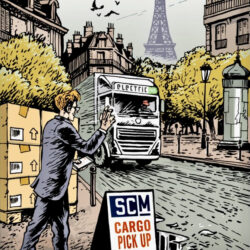Wolves and ships
Are logistics matching platforms a wolf in sheep’s clothing for freight forwarders? That’s the question posed by Rob Zuidwijk, Professor of Global Supply Chains & Ports at Erasmus University in Rotterdam, in a recently published report.
He writes that digital forwarders like Flexport, Shypple and Cogoport are winning market share from traditional forwarders with their online booking platforms. Zuidwijk points out that the rise of these types of platforms has been hugely disruptive in other industries, such as Uber for cab services, Booking.com for hotel bookings and Just Eat Takeaway for home deliveries. However, the comparison with the proverbial wolf in sheep’s clothing is flawed, because rather than being in disguise, the digital players are simply outright competitors in the relatively traditional logistics market.
The report also completely ignores the inherent dynamics of the world of start-ups and more mature scale-ups with their various logistics solutions. Just like more established businesses, these young companies got caught in the economic storm of the coronavirus pandemic last year and it was a case of all hands on deck to survive.
Uber Freight
The American giant Uber tried to gain a foothold in Europe with its subsidiary Uber Freight, a matching platform for road transport, but failed miserably and was taken over by the German scale-up Sennder. Despite the COVID-19 crisis, Quicargo – Sennder’s Dutch counterpart – succeeded in tripling its turnover last year by rapidly expanding its transport network, which allowed carriers to pick up additional shipments and thus generate extra revenue. Meanwhile, in a strong show of resilience, the Swiss scale-up Luckabox managed to avoid bankruptcy in 2020 thanks to its last-mile platform for retailers who experienced explosive growth in online orders due to the lockdowns.
European supply chain start-up landscape
For the fourth consecutive year I’ve analysed the European supply chain start-up landscape. It’s difficult to compare this landscape to the animal kingdom, and it’s certainly not a case of wolves and sheep. Instead, for me the start-ups and scale-ups are more like ships and yachts that have to withstand the gigantic waves of the economy, just like the large container ships and oil tankers do as they sail the seas. In order to survive, the skippers sometimes have to toss bureaucratic ballast overboard. Above all, they must keep a firm hand on the rudder at all times.
Martijn Lofvers, Chief Trendwatcher Supply Chain Media
martijn.lofvers@supplychainmedia.nl









